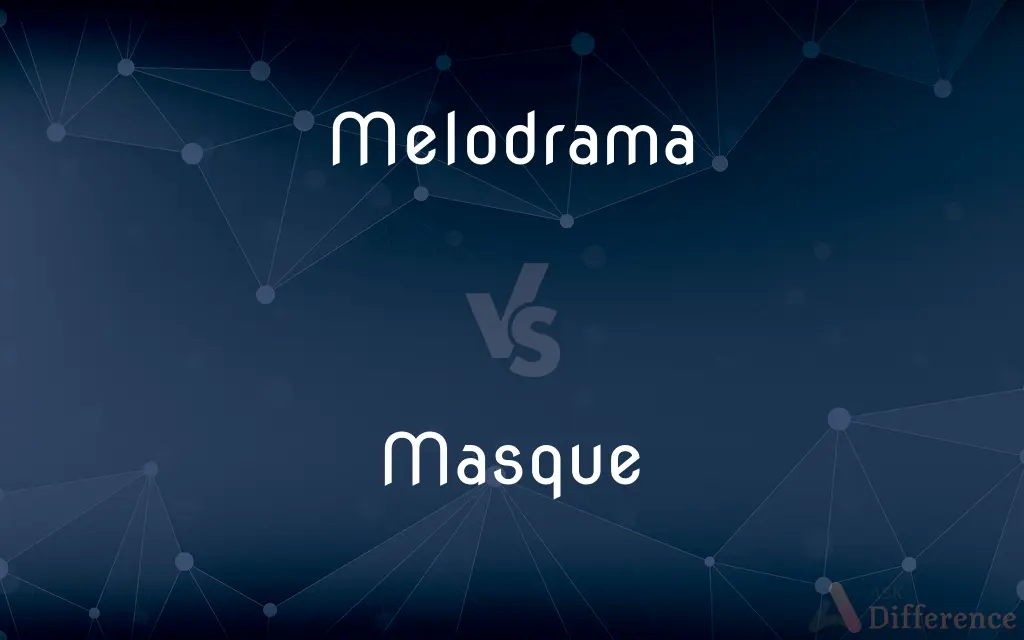Melodrama vs. Masque — What's the Difference?
By Tayyaba Rehman — Updated on September 17, 2023
Melodrama is a dramatic genre emphasizing exaggerated emotions and plot, while masque is a form of courtly entertainment combining poetry, music, and dance.

Difference Between Melodrama and Masque
Table of Contents
ADVERTISEMENT
Key Differences
Melodrama is a form of theater that aims to evoke strong emotional responses through the use of exaggerated characters, situations, and dialogue. It often includes moral lessons and clear distinctions between heroes and villains. Masque, on the other hand, is a courtly form of entertainment that combines music, drama, and dance, often employed to celebrate royal or noble events in the 16th and 17th centuries.
Melodrama often centers on domestic or personal issues and is usually designed to appeal to a broad audience. Masque is historically a more elitist form, catering to aristocracy and often enacted by amateurs in court settings. While melodrama might include elements like suspenseful music and cliffhangers, masque incorporates highly stylized dance and allegorical or mythological themes.
In melodrama, music often serves to underscore emotional moments or impending action, creating a heightened atmosphere. In masque, music and dance are integrated into the performance as central elements, not merely as accompaniment. Both forms are theatrical, but they employ music and emotional expression differently.
While melodrama aims for an emotional catharsis and often has a moral lesson at its core, masque is generally more concerned with aesthetics and spectacle. Melodrama often deals with issues that are morally polarized, while masque is more a celebration of artistry and aristocratic life. The primary focus of melodrama is storytelling; for masque, it is presentation and formality.
Comparison Chart
Historical Context
18th century to present
16th and 17th centuries
ADVERTISEMENT
Primary Audience
General Public
Aristocracy
Core Elements
Exaggerated emotion, moral lessons
Music, dance, allegory
Role of Music
Accompanying, emotional impact
Integral, aesthetic focus
Purpose
Emotional catharsis, moral teaching
Spectacle, celebration
Compare with Definitions
Melodrama
Melodrama can also refer to a situation characterized by exaggerated emotions or behavior.
The fight turned into a melodrama when they started shouting and crying.
Masque
A masque is a form of aristocratic entertainment combining music, dance, and drama.
The court held a masque to celebrate the king's birthday.
Melodrama
Melodrama often employs music to heighten emotional moments.
Suspenseful music intensified the melodrama's climactic scene.
Masque
Masques were popular during the 16th and 17th centuries.
The masque was a staple of Elizabethan court entertainment.
Melodrama
Melodrama is a theatrical genre characterized by exaggerated emotions.
The play was a melodrama filled with passionate love and heart-wrenching betrayal.
Masque
Masques were usually performed in noble or royal settings.
The masque took place in the grand hall of the palace.
Melodrama
A drama, such as a play, film, or television program, characterized by exaggerated emotions, stereotypical characters, and interpersonal conflicts.
Masque
Masques have highly stylized dance and costumes.
The intricate choreography of the masque was a sight to behold.
Melodrama
Melodrama often includes moral lessons and clearly defined heroes and villains.
In the melodrama, the hero saved the village and the villain was arrested.
Masque
Archaic form of mask
Melodrama
In modern usage, a melodrama is a dramatic work wherein the plot, which is typically sensational and designed to appeal strongly to the emotions, takes precedence over detailed characterization. Melodramas typically concentrate on dialogue, which is often bombastic or excessively sentimental, rather than action.
Masque
A mask; a masquerade.
Melodrama
The dramatic genre characterized by this treatment.
Masque
A party of guests wearing costumes and masks
Melodrama
Behavior or occurrences having melodramatic characteristics.
Masque
The masque was a form of festive courtly entertainment that flourished in 16th- and early 17th-century Europe, though it was developed earlier in Italy, in forms including the intermedio (a public version of the masque was the pageant). A masque involved music and dancing, singing and acting, within an elaborate stage design, in which the architectural framing and costumes might be designed by a renowned architect, to present a deferential allegory flattering to the patron.
Melodrama
A kind of drama having a musical accompaniment to intensify the effect of certain scenes.
Masque
A dramatic entertainment, usually performed by masked players representing mythological or allegorical figures, that was popular in England in the 1500s and early 1600s.
Melodrama
(countable) A drama abounding in romantic sentiment and agonizing situations, with a musical accompaniment only in parts which are especially thrilling or pathetic. In opera, a passage in which the orchestra plays a somewhat descriptive accompaniment, while the actor speaks
The melodrama in the grave digging scene of Beethoven's "Fidelio".
Masque
A dramatic verse composition written for such an entertainment.
Melodrama
Any situation or action which is blown out of proportion.
Masque
See masquerade.
Melodrama
Formerly, a kind of drama having a musical accompaniment to intensify the effect of certain scenes. Now, a drama abounding in romantic sentiment and agonizing situations, with a musical accompaniment only in parts which are especially thrilling or pathetic. In opera, a passage in which the orchestra plays a somewhat descriptive accompaniment, while the actor speaks; as, the melodrama in the gravedigging scene of Beethoven's "Fidelio".
Masque
A dramatic performance, often performed at court as a royal entertainment, consisting of dancing, dialogue, pantomime and song.
Melodrama
An extravagant comedy in which action is more salient than characterization
Masque
Words and music written for a masque.
Melodrama
Melodrama aims to evoke strong emotional responses from the audience.
The melodrama had the audience in tears by the final act.
Masque
A masquerade.
Masque
Archaic form of mask
Masque
A facial mask.
Mud masque; clay masque
Masque
Masques often featured mythological or allegorical themes.
The masque portrayed the struggle between virtue and vice.
Common Curiosities
Is Masque still performed today?
Masques are rarely performed today but have historical significance.
Who is the intended audience for Melodrama?
Melodrama is aimed at a broad audience and often seeks to evoke strong emotions.
Who is the intended audience for Masque?
Masque was historically performed for aristocrats and members of the court.
Is music important in Melodrama?
Music is often used in melodrama to heighten emotional impact.
Is music important in Masque?
Music is a central element in masque, integrated into the overall spectacle.
What is Masque?
Masque is a form of aristocratic entertainment combining music, dance, and drama, popular in the 16th and 17th centuries.
Is Melodrama a modern form?
Melodrama became prominent in the 18th century and continues to be used today.
Do Melodramas have a moral lesson?
Melodramas often incorporate moral lessons and clearly defined heroes and villains.
What is Melodrama?
Melodrama is a theatrical form emphasizing exaggerated emotions and often incorporating moral lessons.
Can Melodrama be comedic?
Although generally serious, melodrama can include comedic elements.
Can Melodrama stand alone?
Yes, a melodrama can be a self-contained story, unlike a masque, which was often part of larger court festivities.
Is Melodrama only found in theater?
While rooted in theater, melodramatic elements can be found in film, TV, and literature.
Is Masque only found in theater?
Masque is specific to a historical period and setting, primarily as court entertainment.
Is Masque a serious form?
Masques are generally not intended to be serious but rather celebratory and spectacular.
Do Masques have a moral lesson?
Masques are more focused on aesthetic presentation and don't necessarily include moral lessons.
Share Your Discovery

Previous Comparison
Compensation vs. Claim
Next Comparison
Brainstorm vs. SpitballAuthor Spotlight
Written by
Tayyaba RehmanTayyaba Rehman is a distinguished writer, currently serving as a primary contributor to askdifference.com. As a researcher in semantics and etymology, Tayyaba's passion for the complexity of languages and their distinctions has found a perfect home on the platform. Tayyaba delves into the intricacies of language, distinguishing between commonly confused words and phrases, thereby providing clarity for readers worldwide.












































